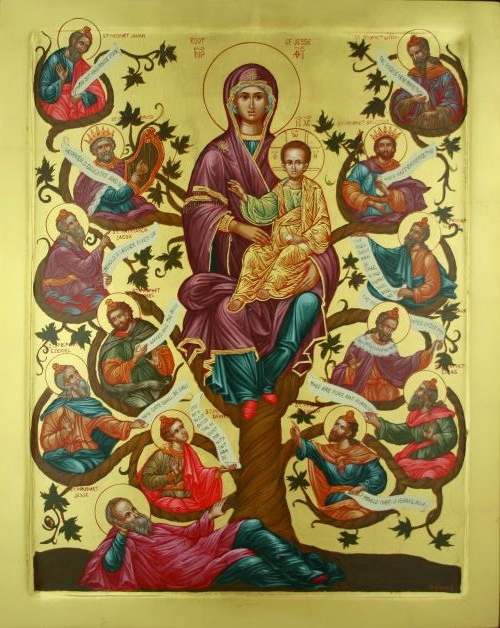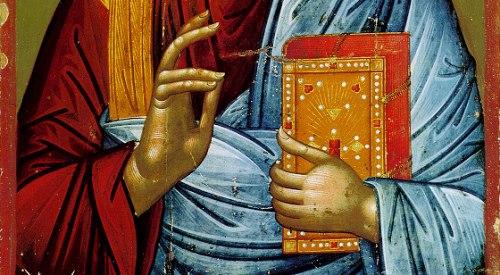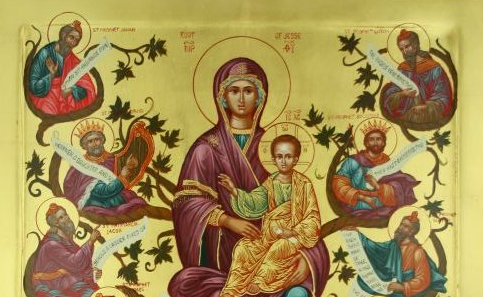Venerable Martyr Eugenia of Rome and those with her; Martyr Achaikos; Venerable Antiochus of Mar Sabbas Monastery; New-martyr Ahmed of Constantinople

The Geneology of Christ according to St. Luke
The Geneology of Christ
The genealogies in the gospels of Saints Matthew and Luke are made to and from Joseph. This is not to give the impression that Jesus came from Joseph’s seed. Both gospels are absolutely clear on this point. Jesus is born from the Virgin Mary by the power of the Holy Spirit. The point is rather that Joseph is Jesus’ father according to the law, and it is from the father that one’s lawful descent is to be traced. Jesus’ legal father is “Joseph, son of David,” the legal husband of Mary (Mt 1:20).
One other important point is made in listing the human generations which led to the birth of Jesus. This is the fact that God is faithful to His promises even though His chosen people are often not faithful. Among the people from whom Jesus came are both sinners and heathens. In a word, Jesus comes not only from the righteous and holy, but from the wicked and sinful. And He comes not only from Jews, but from Gentiles. The names of the four women specifically mentioned in St. Matthew’s list— Tamar, Rahab, Ruth, and the wife of Uriah (Bathsheba)— were noted, not to say notorious, Gentiles, including one of David’s own wives, the mother of Solomon. The point to be seen here is one beautifully made in an early Christian hymn quoted in the Bible in the second letter to Timothy:
If we have died with Him, we shall also live with Him;
If we endure, we shall also reign with Him;
If we deny Him, He also will deny us;
If we are faithless, He remains faithful— for He cannot deny Himself. (2 Tim 2:11-13)
This is the wonderful witness of the genealogies of Jesus: If we are faithless, the Lord God remains faithful— for he cannot deny Himself!
Source: Antiochian Archdiocese Website.
Christmas Worship Services

The Nativity of Our Lord and Savior Jesus Christ
- Friday, December 22, 2017 9:00am. Nativity Royal Hours
- Sunday, December 24, 2017 8:30am/9:30am. Orthros and Divine Liturgy
- Sunday, December 24, 2017 7:00pm. Great Vespers of Nativity
- Monday, December 25, 2017 8:30am/9:30am. Festal Orthros and Festal Divine Liturgy of St. Basil the Great
- Tuesday, December 26, 2017 6:30pm. Divine Liturgy St. Stephanos the First Martyr
St. Stephen the Proto-Martyr (First Martyr) Divine Liturgy on December 26 at 6:30pm

St. Stephen was a Jew living in the Hellenic provinces, related to the Apostle Paul and one of the first seven deacons ordained by the Apostles to serve the Church in Jerusalem (thus making him an Archdeacon). In the words of Asterias: St Stephen was “the starting point of the martyrs, the instructor of suffering for Christ, the foundation of righteous confession, since Stephen was the first to shed his blood for the Gospel.”
The Holy Spirit worked powerfully through his faith, enabling him to perform many miracles and always defeat those who would dispute with him. The Jews in their hatred of St. Stephen lied about him to the people, but St. Stephen with his face illumined reminded the people of the miracles God had worked through him and even rebuked the Jews for killing the innocent Christ.
The people were enraged by what they thought was blasphemy and ‘gnashed their teeth’ at Stephen. It was then that he saw his Christ in the heavens and declared it so. Hearing this, they took him outside the city and stoned him to death, with his kinsman Saul (later St. Paul) holding their coats while they did it. Afar off on a hill was the Virgin Mary and St. John the Theologian who witnessed this first martyrdom for the Son of God and prayed for him while he was being stoned. This occurred about a year after the first Pentecost.
Source: OrthodoxWiki.
Living the Orthodox Faith Class Continues Wednesday, January 10 at 7:00pm
“Living the Orthodox Faith” will look at why our Church does things the way it does, and how to do it properly. We will learn about the sign up the cross, how to enter the Church properly (candles and veneration), how to make a home altar, and more. This is a very practical class, not theological as much as how to live the Orthodox life as an Orthodox Christian.
Can’t make the class? Join in on Facebook Live! You can also view last week’s class too.
Classes will be suspended during the Nativity and Theophany Season and resume in early January.
Christmas Fast Continues
The Nativity Fast is one of the four Canonical Fasting Seasons in the Church year. This is a joyous fast in anticipation of the Nativity of Christ. That is the reason it is less strict than other fasting periods. The fast is divided into two periods. The 1st period is November 15th through December 19th when the traditional fasting discipline (no meat, dairy, fish, wine, and oil) is observed. There is dispensation given for wine and oil on Tuesdays and Thursdays. Similarly, fish, wine, and oil are permitted on Saturdays and Sundays.
The 2nd period is December 20th through 24th when the traditional fasting discipline (no meat, dairy, fish, wine, and oil) is observed. There is dispensation given for wine and oil only on Saturday and Sunday during this period.
Fasting always works in conjuction with prayer and giving alms (helping the poor, giving to worthy charities, etc.). Fasting helps us reorder the interior life, but the reordering does not occur with greater prayer and greater concern for the poor.
The reordering is a clarification — we end up seeing things more clearly, we get stronger in the fight against sin and temptation. The fast always ends on a great Feast Day of our Lord.
For a complete list, visit the Antiochian website or click on the image below:
Calendar At A Glance
December
Nativity (Christmas) Worship Schedule
- Friday, December 22, 2017 9:00am. Nativity Royal Hours
- Sunday, December 24, 2017 8:30am/9:30am. Orthros and Divine Liturgy
- Sunday, December 24, 2017 7:00pm. Great Vespers of Nativity
- Monday, December 25, 2017 8:30am/9:30am. Festal Orthros and Festal Divine Liturgy of St. Basil the Great
- Tuesday, December 26, 2017 6:30pm. Divine Liturgy St. Stephanos the First Martyr
January
- Monday, January 1, 2018 6:30pm Divine Liturgy St. Basil the Great and Circumcision of Christ
- Friday, January 5, 2018 9:00am/10:00am. Royal Hours and Vesperal Liturgy of St. Basil
- Saturday, January 6, 2018 9:00am/10:15am. Divine Liturgy and Blessing of the Waters
- Wednesday, January 10, 2017 7:00pm. Living the Orthodox Faith Class
Why More Liturgies?
Because we are Orthodox, and the entire Orthodox Christian life begins with the worship of God. In worship we find the well of living water that nourishes our soul and gives us life, and that we take into every corner of our lives outside of the Church.
Another reason is that when we honor the Saints we invite them to be present with us.
Wisdom From The Elders
It is preferable for a sensitive person to die once out of love in order to protect his neighbour, rather than be neglectful or cowardly and then to be constantly tormented by his conscience for the rest of his life.
Elder Paisios of Mount Athos
With the name of Jesus cut off their heads, that is, the first appearance of sin in our thoughts, fancies and feelings. Destroy within you the devil’s rule over you; destroy all his influence over you; acquire spiritual freedom.
St. Ignatius Brianchaninov
In order to acquire true humility in Christ, one must first bear the humiliation of Christ, one must be the last among his brothers and a servant to them, in order to be a true disciple of Jesus.
Elder Basilisk
Humility is a Divine property and the perfection of the Christian life. It is attained through obedience. He who is not obedient cannot attain humility. There are very few in the world today who have obedience.
Elder Thaddeus of Vitovnica
If wrong actions occur, it means that our inner state is wrong; and it is this inner state which determines our worth before God-our essential worth.
Unseen Warfare
St. Gregory of Nyssa understands that the way to divine knowledge is purity of body and soul. He who is going to ascend must be, as far as it is possible, pure and spotless, both in body and soul.
Hierotheos Vlakos
Remember in Your Prayers
Rosie
Jill
Connie
Sean Helgeland (great nephew to Steve and Anne Brietenbach)
Kathryn
Jeremy
Robert
Jane
Theodora
Baby Brynn L.
Micheal
Haralambos
Lillian
Presbytera Rosy
Valentina
John
Eva W.
Barbara
Angela
Sonya
Kenneth
Carol Ann
Matthew
Chrysostom
Tim
Ron
Ivy-Jean
Pat
Christina
Maria Louise
Maximos
Marian
Photini
Nicholas
Sarah
Petronia (Wife of Phil Pappas)
Constantine Houpis
Anna Marie Smith Baker
Ron Chromulak
Beverly Chromulak
Katerina
Loucine Kassis
Mary Kassis
Baby Maximus
Christine
Maria
Annette Star
Claire Livaditis
Eva Chandilles
Baby Dani
Scott Nedoff
Anthony Mourgis
John Hansen
James Hord
Tom and Jean, parents of Patty and Jerry.
How should we pray for the sick? Remember them daily. Say their names (first names are sufficient) and ask God to bestow mercy and grace on them.
Add or remove names and print this list for easy reference during your prayer time on the St. Peter website.
Sunday Readings

Epistle
For the Sunday before the Nativity
Blessed are Thou, O Lord, the God of our fathers.
For Thou art justified in all that Thou hast done for us.
The Reading from the Epistle of St. Paul to the Hebrews. (11:9-10, 32-40)
Brethren, by faith Abraham sojourned in the land of promise, as in a foreign land, living in tents with Isaac and Jacob, heirs with him of the same promise. For he looked forward to the city which has foundations, whose builder and maker is God. And what more shall I say? For time would fail me to tell of Gideon, Barak, Samson, Jephthah, of David and Samuel and the prophets— who through faith conquered kingdoms, enforced justice, received promises, stopped the mouths of lions, quenched raging fire, escaped the edge of the sword, won strength out of weakness, became mighty in war, and put foreign armies to flight. Women received their dead by resurrection. Some were tortured, refusing to accept release, so that they might rise again to a better life. Others suffered mocking and scourging, and even chains and imprisonment. They were stoned, they were sawn in two, they were killed with the sword; they went about in skins of sheep and goats, destitute, afflicted, ill-treated—of whom the world was not worthy—wandering over deserts and mountains, and in dens and caves of the earth. And all these, though well attested by their faith, did not receive what was promised, since God had foreseen something better for us, that apart from us they should not be made perfect.
Gospel
For the Sunday before the Nativity: “The Genealogy”
The Reading from the Holy Gospel according to St. Matthew. (1:1-25)
The book of the genealogy of Jesus Christ, the son of David, the son of Abraham. Abraham was the father of Isaac, and Isaac the father of Jacob, and Jacob the father of Judah and his brothers, and Judah the father of Perez and Zerah by Tamar, and Perez the father of Hezron, and Hezron the father of Aram, and Aram the father of Amminadab, and Amminadab the father of Nahshon, and Nahshon the father of Salmon, and Salmon the father of Boaz by Rahab, and Boaz the father of Obed by Ruth, and Obed the father of Jesse, and Jesse the father of David the king.
And David was the father of Solomon by the wife of Uriah, and Solomon the father of Rehoboam, and Rehoboam the father of Abijah, and Abijah the father of Asa, and Asa the father of Jehoshaphat, and Jehoshaphat the father of Joram, and Joram the father of Uzziah, and Uzziah the father of Jotham, and Jotham the father of Ahaz, and Ahaz the father of Hezekiah, and Hezekiah the father of Manasseh, and Manasseh the father of Amon, and Amon the father of Josiah, and Josiah the father of Jechoniah and his brothers, at the time of the deportation to Babylon.
And after the deportation to Babylon: Jechoniah was the father of Shealtiel, and Shealtiel the father of Zerubbabel, and Zerubbabel the father of Abiud, and Abiud the father of Eliakim, and Eliakim the father of Azor, and Azor the father of Zadok, and Zadok the father of Achim, and Achim the father of Eliud, and Eliud the father of Eleazar, and Eleazar the father of Matthan, and Matthan the father of Jacob, and Jacob the father of Joseph the husband of Mary, of whom Jesus was born, Who is called Christ.
So all the generations from Abraham to David were fourteen generations, and from David to the deportation to Babylon fourteen generations, and from the deportation to Babylon to the Christ were fourteen generations. Now the birth of Jesus Christ took place in this way. When His mother Mary had been betrothed to Joseph, before they came together she was found to be with child of the Holy Spirit; and her husband Joseph, being a just man and unwilling to put her to shame, resolved to divorce her quietly.
But as he considered this, behold, an angel of the Lord appeared to him in a dream, saying, “Joseph, son of David, do not fear to take Mary your wife, for that which is conceived in her is of the Holy Spirit; she will bear a son, and you shall call His Name Jesus, for He will save His people from their sins.” All this took place to fulfill what the Lord had spoken by the prophet: “Behold, a virgin shall conceive and bear a son, and His Name shall be called Emmanuel” (which means, God with us). When Joseph woke from sleep, he did as the angel of the Lord had commanded him; he took his wife, but knew her not until she had borne a son; and he called His Name Jesus.



